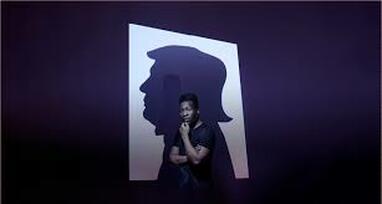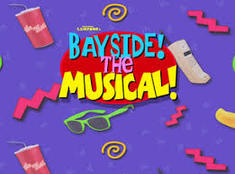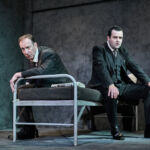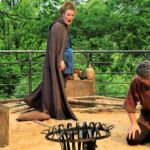 We Return to Live Theatre! 'Adventures with the Painted People' at Pitlochry Festival Theatreby Randi / June 18, 2021
We Return to Live Theatre! 'Adventures with the Painted People' at Pitlochry Festival Theatreby Randi / June 18, 2021It’s Theatre Thursday! Today’s show is the recent streaming production of ‘Mr. Burns’ from the Guidhall School of Music & Drama. It was live-streamed in late May and then reshared for pick-your-own-time-with-the-ability-to-pause-it viewing (unbeatable) this past month.
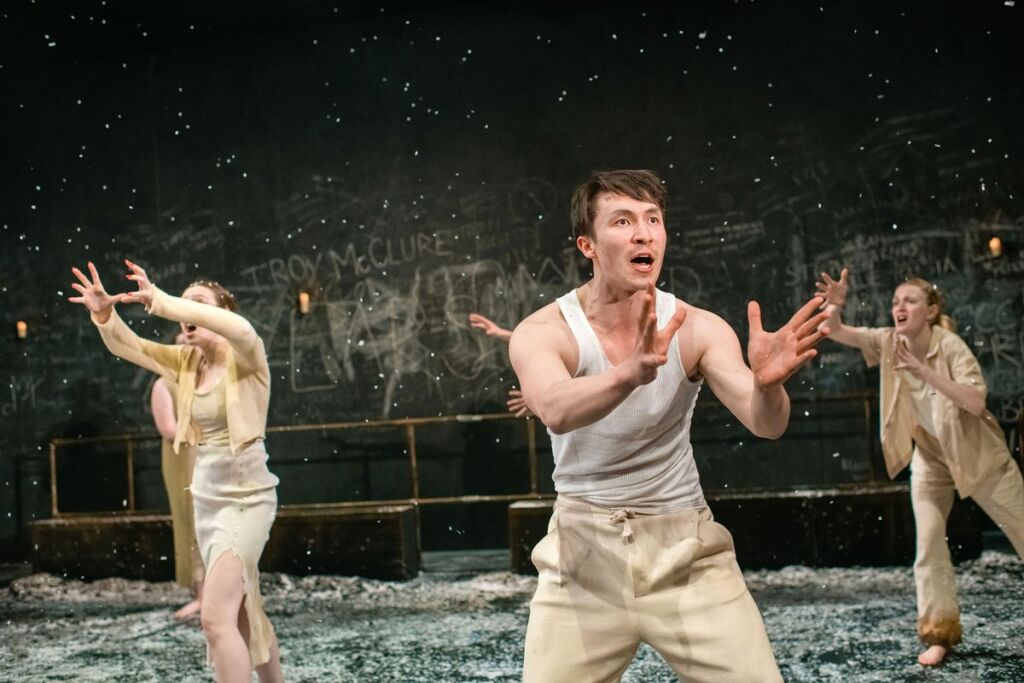
Mr. Burns, Anne Washburn’s lauded (and somewhat divisive) 2012 play, analyzes how culture evolves over time, with the help of The Simpsons. In Washburn’s dystopian society, an apocalyptic event has wiped out most people and all the power — the proper stylized title is actually Mr. Burns, a post-electric play. Overall, the play is fascinating in how it weaves details of a single episode of TV into markers of cultural importance over distinct time periods, in a fun (for Simpsons fans, not that the downer of a play is any fun) clever way of contemplating how history and culture are formed.
In this newest incarnation, I think it was hinted at that a virus did the people wiping part (gotta make shit relevant and more terrifying!), and the lack of sufficient people to attend to places like nuclear power plants did the rest. We meet a scraggly bunch of survivors around a campfire, where the zigzagging conversation intertwines stories of cities they’ve traveled to and what they found there, with a discussion about The Simpsons. The group tries to collectively share the play-by-play of the episode from memory – of course, as that’s all they have. It helps to be familiar with The Simpsons, especially the crucial episode Cape Feare – crucial for Simpsons fans, I believe (and musical theatre fans), and for appreciating this play.
This first act is filled with frustration and sadness — at the lack of knowledge about what’s going on in other parts of the country and who else has survived, as well as at their inability to ever truly find out what parts of the episode they are forgetting or misremembering. In this strongest part of the play, the emotional roller coaster from the excitement as the characters finally remember a line of dialogue, from the terror when someone new happens upon their location, from the grief and misery when they deliver their memorized lists of names of people they’re looking for, it’s a lot but it all feels earned.
But it’s the ensuing acts that show the cleverness of the play’s central concept. It jumps to 7 years later, when groups of survivors have become like traveling theatre troupes who perform — episodes of The Simpsons, especially Cape Feare. The way the seemingly casual campfire conversation has become one of the most fundamental parts of the society they’re forming is so interesting. It’s something that most people remember watching at some point, but they’ve latched onto it and given it enhanced importance in this new world, seemingly just to share something they can believe is important. The details have gotten messier, the lines a little paraphrased, as memories have faded and altered. Strangely, the survivors have given the same reverence to the inclusion of commercials in their productions. While it’s interesting to see what kinds of things they think would be advertised, there is way too much time spent on showing us their commercials, and even more time spent on a non-Simpsons non-commercial musical performance. Details from this performance make it into the third act in compelling ways that support the central idea, but the same result is achieved with the Simpsons details alone.
And that third act is wild. It’s now 75 years later, and the society has developed what seems like a serious religion and candle-filled religious ritual based on what has lasted from this episode of The Simpsons. Mr. Burns, earning the title placement, is now a murderer trying to kill the entire Simpsons family, and, well, doing so. The entire act is this religious ritual, a music-filled performance of what’s now their sacred stories. The once remembered details now have obviously been completely transformed, mutated into something unrecognizable but still with familiar aspects – the character names, the boat, the singing, the Gilbert & Sullivan lyrics. It’s an insane ride. I loved how all of these sections show how culture and history adapt over time, as certain things are remembered, misremembered, and reconstructed in human societies. It’s a reminder that the history we know and study all depends on a human’s retelling of an event, and humans are imperfect, biased historians. The way certain details hold fast through all three time periods in the play, and the way others morph into unrecognizable and surprising new cultural tenets, are a fascinating reflection of culture and how tenuous it is.
However. This third act is too long and overindulgent. It takes the unnecessary and overly long musical number of the second act and forking runs with it. This section is so long and chaotic and disconnected from the emotional beats the previous two sections had managed to achieve that I actually got annoyed. I may have audibly sighed. It didn’t help that the singing wasn’t great (I won’t say any more about the actors, who were all fine, because I think they’re students and like, they’re not done training). But even so this act was overall Too Much, nearly negating all the clever goodwill from before.
Information:
Run & running time: Mr. Burns runs about 2 1/2 hours. (It should run about 2 hours 10 minutes.) Hopefully Guildhall will release the stream again, or a new production (that makes cuts) will come, because it is such an interesting play.
Technicals: The stream froze every 5 minutes. For the amount of streaming theatre we’ve watched in the past year (it’s a shittonne), we’ve really only had issues when the stream is set up to defend a higher quality image instead of reducing the picture quality when necessary and focusing on continuous play and sound. I don’t know how to describe it I’m not a computer. But that’s the issue most of the time. Always choose continuous play over the image quality mes babies.
Toilets & Audience: Watched at home baby!!
What antisemitic thing did I notice this time*: The programme describes the ragtag group of characters as ‘schlocky’, which is a Yiddish-derived word used to describe cheap, junky goods, so it was very much not used properly. [*A new question I will probably need to ask more going forward! (Obvs I am joking about it being offensive…just to my history as an editor.)]


